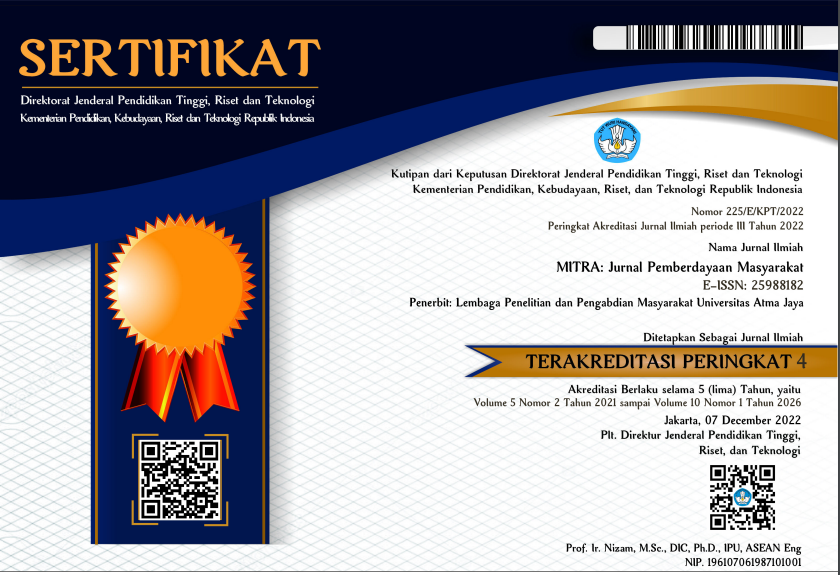Encouraging Student’s Pro-environmental Behavior in East Beji, Depok
DOI:
https://doi.org/10.25170/mitra.v3i1.498Kata Kunci:
behavior, pro-environmental, children, kindergartenAbstrak
The commitment to green behavior can be implemented through some activities in Raudhatul Athfal Toufiqurrahman. However, the implementation of such commitment faces two problems, namely social cultural aspects and the lifestyles of society. Differences in knowledge, educational background, and experience or lifestyle may hinder parents and teachers from being able to give proper guidance to their children and students about environment-friendly activities. Schools have limitation in organizing these activities and therefore they need to be helped. The goal of the community service program reported in this paper was to supervise teachers when introducing and evaluating environment-friendly activities. Teachers were chosen to be involved in this program so that they would be able to improve parents’ and students’ awareness about environment-friendly activities. The results showed that there was a change in students’ behavior, for example in using different types of garbage bin, in maintaining the cleanliness of the river, and in recycling unused materials for students’ crafts. However, other types of behavior such as energy-saving behavior and parents’ supervision tended to be getting lower and some were similar to those others observed before. We found that parents and students would support the green behavior movement and encourage pro-environmental behavior among kindergarten students.
Referensi
Blankenberg, A. K., & Alhusen. H. (2018). On the determinations of pro-environmental behavior–a guide for further investigation. Discussion Papers, Center for European Governance and Economic Development Research, 350.
Erhabor, N. I., & Oviabon, C. (2018). Relationship between family functioning and environmental attitude on the environmental behavior of students in a Federal University in Edo State, Nigeria. European Journal of Sustainable Development Research, 2(3), 28, 1-5.
Gifford, R. & Nilsson, A. (2014) Personal and social factor that influence pro environmental concern and behavior: a review. International Journal of Psychology, 46(3), 141-157.
Heni M., & Kartika N. (2017). Motivasi green behavior: Kegiatan bersama POMG Raudhatul Athfal Toufiqurrahman Beji Timur Depok. Prosiding Seminar Nasional Senapenmas, 22--23 November, Untar Jakarta.
Kartika N., Heni M., & Haris, D.A. (2017). Pengenalan dan implementasi green behavior pada taman kanak-kanak di Beji Timur Depok. Prosiding Seminar Nasional Senapenmas, 22--23 November, Untar Jakarta.
Kollmuss, A., & Agyeman, J. (2002). Mind the gap: Why do people behave environmentally and what are the barriers to pro-environmental behavior? Environmental Education Research, 8(3), 239--260. DOI: 10.1080 /1350462022014540 1.
Markle, G. (2013). Pro-environment: Does it matter how it’s measured? Development and validation of the pro-environmental behavior scale (PEBS). Human Ecology, 41(8), 905-914. DOI 10.1007/s10745-013-9614-8.
Panjaitan, T. W.S. & Sutapa, I. N. (2010). Analysis of green product knowledge, green behavior and green consumers of Indonesian students (Case Study for Universities in Surabaya). Preceeding IEEE IEEM.
Palupi, T., & Sawitri, D.R. (2017). Hubungan antara sikap dengan perilaku pro-lingkungan ditinjau dari perspektif theory of planned behavior. Proceeding Biology Education Conference, 14(1), 214—217.
Paula T. A., Kartika N., & Herlina B. (2015). Pengenalan green school pada lingkungan Sekolah Taman Kanak-Kanak Talenta Pasar Minggu Jakarta Selatan. Prosiding Seminar Nasional SNH3P, 19--20 Mei, Untar Jakarta.
Perda Kota Depok No. 16 Tahun 2012 Pembinaan dan Pengawasan Ketertiban Umum.
Perda Kota Depok No. 15 Tahun 2013 Penyelenggaraan Kota Layak Anak.
Somwaru, L. (2016). The Green school: a sustainable approach toward environmental education: Case study. Brazilian Journal of Science and Technology, 3(10), 1--15.
Strange, T., & Bayley, A. (2008). Sustainable development linking economy, society, environment.Http://www.sjalfbaerni.is/media/frodleikur/OECD-skyrsla.pdf. Diakses 8 Maret 2017.
Unduhan
Diterbitkan
Cara Mengutip
Terbitan
Bagian
Lisensi
This license allows reusers to distribute, remix, adapt, and build upon the material in any medium or format for noncommercial purposes only, and only so long as attribution is given to the creator. If you remix, adapt, or build upon the material, you must license the modified material under identical terms.







_.jpeg)




.png)
2.png)
.png)
.png)



